正说反译
英汉互译中的正反反正表达法

英汉互译中的正反反正表达法在英汉互译过程中,由于两种语言表达习惯不同,往往需要把英语中的正说译成汉语中的反说,把英语中的反说译成汉语中的正说,或反之,这样才能确切表达原意并符合语言的规范。
这种把正说处理为反说,把反说处理为正说的译法,叫正反、反正表达法。
这种正说和反说的相互转换是翻译技巧中的一个重要方法。
它属于引申和修辞范围。
那么,什么是正说和反说呢?英语词句中含有“never”,“no”,“not”,“non-”,“un-”,“im-”,“in-”,“ir-”,“-less”等成分以及汉语词句中含有“不”、“没”、“无”、“未”、“甭”、“别”、“休”、“莫”、“非”、“毋”、“勿”等成分的为反说,不含有这些成分的为正说。
正说和反说包括的词类范围很广,不仅包括动词、形容词、副词、名词、介词和连词,而且包括各种词组,短语和从句。
现以实例对正反、反正表达法加以说明。
一、英译汉正说反译法在不少情况下,由于有的词语含有特殊意义,如不从反面着笔,译文就不通,这时必须反说。
例如:1)“I have read your articles.I expect to meet an old man.”“我读过你的文章,没想到你这样年轻。
”(动词)2)He was absent from his own country last year.他去年不在自己的国家。
(形容词短语)3)He dived into the water fully clothed and rescued the children.他衣服没脱就跳入水中,把孩子救了上来。
(副词)4)He was extremely sorry for the shortness of time.他对时间不足感到十分抱歉。
(名词)5)I do think that it is beyond his power to fulfill the task.我的确认为要完成这项任务是他力所不及的。
正说反译-反说正译
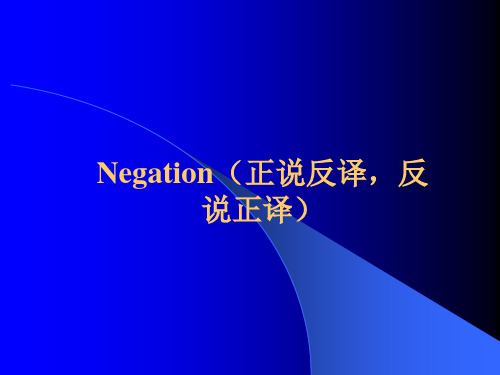
“It + be + adj. + noun + that…”句式的反面着笔 译法: (17) It is a wise father that knows his own child. 聪明的父亲也未必了解他自己的孩子。 (18) It is an ill wind that blows nobody good. 坏事未必对人人都有害处。 (19) It is a good workman that never blunders. 智者千虑必有一失。 (20) It is a long lane that has no turning. 凡事总有变化,还会永远不变。
(1) I couldn’t agree more. (2) You couldn’t be better off, could you? (3) Nothing is farther from the truth. (4) I can hardly imagine two men less capable of getting on together. (5) I was weighed down with grief; my friend’s books offered little release, less escape. (6) He could not care less about money.
(6) They didn’t praise him in the slightest. (7) I’m afraid not. (8) I don’t know how often I haven’t warned you. (9) His speech leaves much to be desired. (10) No news is good news.
正说反译反说正译法
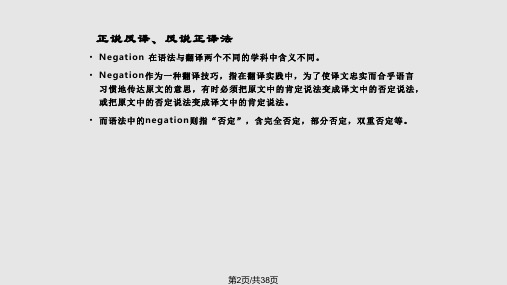
• 那些革命者当时受到拷打,不准阅读任何书 刊..
• The window refuses to open.
single family, was solved quickly by the collective. • 个别家庭无力解决的这个问题,通过集体能迅速得到解决。
第19页/共38页
正说反译法(介词)
• There is nothing in this shop above $5. • 这家商店卖的东西价钱都不超过5美圆。 • Leifeng’s noble deeds are above all praise • 雷锋的高尚事迹令人赞扬不尽。 • He is above meanness and deceit. • 他不至于做卑鄙和欺骗人的事情。 • Her behaviour was above suspicion. • 她的品行不容怀疑、
• 由于看不到、也不去分析语言问题与非语言问题 之间的相互关系,产生了两大不足
• This failure was the making of him.
• 这次不成功是他成功的基础。
• The government第’16s页/f共a38i页lure to carr y out
• Tom will be in charge of the office during my absence. • 我不在的时候,办公室由汤姆负责。 • Why does he say nothing about the total absence from his list
正说反译,反说正译法例子
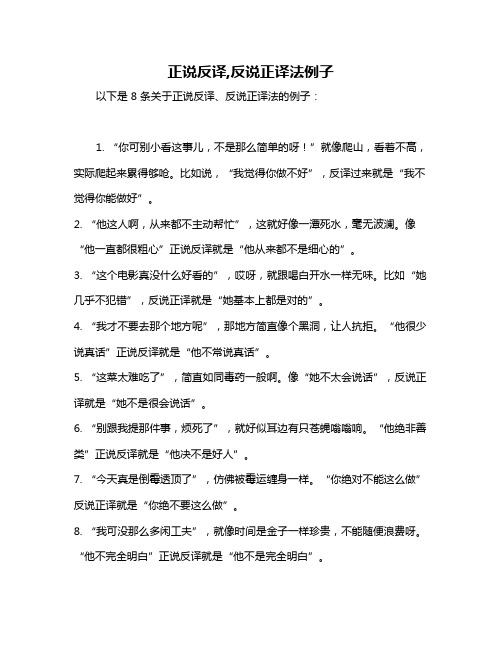
正说反译,反说正译法例子
以下是 8 条关于正说反译、反说正译法的例子:
1. “你可别小看这事儿,不是那么简单的呀!”就像爬山,看着不高,实际爬起来累得够呛。
比如说,“我觉得你做不好”,反译过来就是“我不觉得你能做好”。
2. “他这人啊,从来都不主动帮忙”,这就好像一潭死水,毫无波澜。
像“他一直都很粗心”正说反译就是“他从来都不是细心的”。
3. “这个电影真没什么好看的”,哎呀,就跟喝白开水一样无味。
比如“她几乎不犯错”,反说正译就是“她基本上都是对的”。
4. “我才不要去那个地方呢”,那地方简直像个黑洞,让人抗拒。
“他很少说真话”正说反译就是“他不常说真话”。
5. “这菜太难吃了”,简直如同毒药一般啊。
像“她不太会说话”,反说正译就是“她不是很会说话”。
6. “别跟我提那件事,烦死了”,就好似耳边有只苍蝇嗡嗡响。
“他绝非善类”正说反译就是“他决不是好人”。
7. “今天真是倒霉透顶了”,仿佛被霉运缠身一样。
“你绝对不能这么做”反说正译就是“你绝不要这么做”。
8. “我可没那么多闲工夫”,就像时间是金子一样珍贵,不能随便浪费呀。
“他不完全明白”正说反译就是“他不是完全明白”。
我觉得这种翻译方法很有趣,能让我们更灵活地理解和运用语言,有时候能更加准确地表达出我们的意思呢!。
正反、反正译法

(二)英译汉反说正译法:英语从反面表达, 汉语从正面表达
反正译是用变换语气的方法把原文的否定式译成 汉语的肯定式。翻译时运用这一方法可使译文自然 流畅。 英语中含有否定词语的结构和双重否定的结构常有 这种方法来解释。英语中表达否定意思的词或词组 指带有de-, dis-, im-, in-, un-, less-等词缀的词和 no, not, not…until, no less than, no more than, Nothing than, nothing but, cannot…too 等表示 否定的词或词组。
赶快把这封信寄出去。
She is no less diligent than her sister. 她和她姐姐一样用功。 Such things couldn’t long escape notice. 这类事情迟早会被人发觉的。 We did not notice this matter until yesterday. 直到昨天我们才注意到这件事。 We can not be too careful in doing experiments. 我们做实验越仔细越好。
(一)英译汉正说反译法:英语从正面表达, 汉语从反面表达
正反译是用变换语气的方法把原文的肯定式译成 汉语的否定式。翻译时运用这一方法可使译文合乎 汉语规范,更恰当地表达原文的意思。
例如, correct 可译成“没有毛病”,wonder可译成 “不知道”,exactly可译成“一点不错”,anythi but可译成“一点也不”等等。
Never too old to learn. 活到老,学到老。 I couldn’t agree more about it. 我对此非常赞同。 His story was nothing but lies. 他的那番话纯粹是谎言。 Our advice was not lost on him. 我们的劝告对他起了作用。 There is no rule but exceptions. 凡规则总有例外。 Don’t lose time in posting this letter.
句子翻译正说反译反说正译

proposal with dignity.
正说反译
(一)汉、英两种语言的表达习惯不 同。
• 我很快就可以回老家了。
• It will not be long before I go back to my hometown.
(二)语气的需要。 • 有失才有得。
• You can’t make an omelet without breaking eggs.
正说与反说
• 但是由于汉英两种语言表达习惯 不同,在很多情况下会出现正说 反译,反说正译的情况。
• 我完全同意。 • I can't agree with you more. • 你们大错特错了。 • You couldn't be more mistaken.
正说与反说
• 油漆未干! • Wet paint! • 不好意思! • I‘m sorry. • 外表往往是靠不住的。 • Appearances are often deceptive. • 美国不失体面地接受了这项和平方案。 • The U.S.A accepted the peace
他上火车站去接他的朋友,可是未 能在人群中见到他。
He went to the station to meet his friend, but he missed him in the crowd.
与翻译有关的那些--反译法

The window refuses to open. 窗户打不开。
正说反译法(动词)
She was refused admittance by them. 他们不许她进去。 Permission to enter was denied. 不准入内。 I was denied the chance of going to university. 我没有得到上大学的机会。
Her abstraction was not because of the tea party. • 她那心不在焉的神情,并不是因为茶话会。
His hesitation led to his failure. • 他不果断/犹豫不决导致了他的失败。
正说反译法(虚词:介词)
To do this is beyond my ability. 干这事我力不胜任。 It was beyond his power to do so. 他无权这样做。
正说反译法(虚词:连词)
The soldiers would fight to death before they surrender. 战士们宁可战斗到死,而决不投降。
I will not go unless I hear from him. 如果他不通知我,我就不去。
正说反译法(虚词:连词)
What you’ve said is above me. 你所说的我不懂。
正说反译法(虚词:介词)
It seems against nature. 这似乎不符合自然规律。
He is above meanness and deceit. 他不至于做卑鄙和欺骗人的事情。
翻译正说反译法PPT课件

正说反译(形容词反译)
1. I'm new to the work. 我不熟悉这工作。
2. Appearances are deceptive. 外貌是靠不住的。
3. We must be free from arrogance and rudeness and learn from people. 我们必须不骄不燥,向人民学习。
正说反译(动词反译)
1. He missed the first train this early morning. 他今天清晨没有赶上第一班列车。
2. That's a thing that might happen to any man. 这种事情谁也难免。
3. My father will kill me when he finds out. 我父亲要是知道了,准饶不了我。
这类飞机迟早会被人发觉的。
4. You can’t be too carefully. 你要格外小心。
习惯用法和固定搭配
英语有些短语形式上是否定的,但表达的内容确实 肯定得,如:not…until, never…without, no one but 等,含有这些短语的句子译成汉语时大多从正面表 达。 1. They gave me the wrong book, and I didn’t notice it I guonttbilack my room.
正说反译(介词反译)
1. This problem is above me. 这个问题我解决不了。
2. It is beyond his power to preside over such an important meeting.
主持这样重要的会议是他力所不能及的。
第二组 正反译法
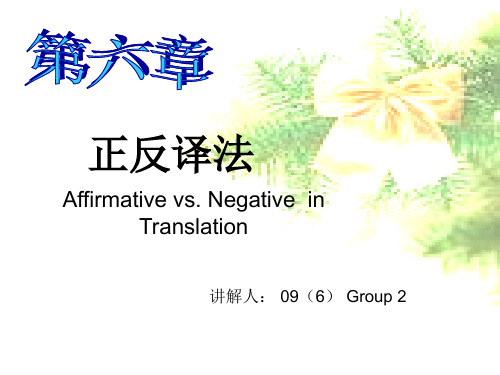
5. Don’t lose time in posting this letter. 赶快把这封信寄出去。 6. The significance of these incidents was not lost on us. 这件事引起了我们的重视。
Negative in English, but Affirmative in Chinese 英译汉反转正
1. The examination left no doubt that the patient had died of cancer. 调查结果清楚的说明病人死于癌症。
2. It is the only possession that I have not given up. 这是我所保留的唯一财产。
(2) 我们完全不知道他的计划。 We are in complete ignorance of his plan. (3) 他未能履行诺言,我们大家都很失望。 His failure to carry out his promise has disappointed everyone of us.
What is Affirmation? What is Negation?
英语中带no, not, none, nothing, nowhere, nobody,never, neither, nor等否定词,或non-, un-, im-, in-, ir-, dis-, non-, -less等否定词缀的词句, 汉语中 含有“不”、“没有”、“无”、“非”、“未”、“否”、 “休”、“勿”、“别”、“莫”、“毋”等成分的词句, 都称为反说或者称为否定。相反,英汉语中不含这些成分 的词句称为正说,即肯定。
正说反译

up
CONTENT
② Negation ③ What
is a positive sentence ?
④正说反译的目的
⑤英译汉正说反译法
⑥汉译英正说反译法
Warming up
(1) Wet paint! Keep upright! 油漆未干! 切勿倒置! (2) I wrote three books in the first two years, a record never reached before. 我头两年写了三本书,打破了以往的记录。 原文从反面表达,译文从正面表达。如译成“这是 他从前从未达到的记录”则显得很别扭。 (3) I have read your articles, but I expect to meet an older man. 我读过你的文章,但没料到你这样年轻。 本句如译成“我读过你文章,但我料想会见到一个 年纪更大的人”则不符合汉语表达习惯。
Negation
Negation 是一种翻译技巧。从翻译角 度来看,Negation是指在翻译实践中, 为了使译文忠实而又符合语言习惯的 表达原文的思想,有时必须把原文中 的肯定说法变成译文中的否定说法, 或是把原文中的否定说法变成译文中 肯定说法,因此,翻译技巧中将其译 成“正说反译,反说正译”更为合适。 从语法角度来说,Negation译成“否 定”,它大致可以分为以下几类:
副词
A: The boy is quite clever . B: Exactly.甲:这孩子很聪明。乙:一点也不错。
Examples
前置词
1)This problem is above me . 这个问题我解决不了。 (或,这个问题我不懂。) 2)It was beyond his power to sign such a contract.他无权签订这种合 同。
正说反译反说正译法

团结 信赖 创造 挑战
正说反译法(动词)
• They excluded children from getting in. • 他们不准小孩入内。 • The evidence is conclusive, excluding all
• Mr. White has refrained from making any official comment on the coup in that country.
• 怀特先生并没有对该国的政变发表正式评 论
• She refrained from laughing. • 她忍住了,没有发笑。
questions. • 他试图避而不答我的问题。
团结 信赖 创造 挑战
• There正ar说e tw反o a译spe法cts(to形eve容ryt词hin)g,to say
there is only one is to be aware of one aspect and to be ignorant of the other. • 任何事物都有两点,说只有一点叫只知其一 不知其二。 • The County Party Committee here is ignorant of conditions at the lower levels. • 那里的县委不了解下情。 • He is not only stupid,but also ignorant. • 不仅愚蠢,而且无知。
商务英语翻译3词类转换正说反译与反说正译

精选ppt课件
16
2.3. 副词转译成名词
▪ The supermarket would give everyone 10% off on all cash purchases.
▪ 那家超市将给每一位用现金购物的顾客10% 的优惠( 折扣)。
▪ What is the fare to London and back? ▪ 去伦敦一个来回需要多少钱?
些介词在汉译时往往译成动词。如:
▪ The judge sat in the dining room amid (处理)his morning mails.
▪ Carlisle Street runs westward(向西延伸), across (越过) a great black bridge, down (爬下)a hill and up(爬上) again, by (经过)little sloops(单桅船) and meat markets, past (路过)single storied homes, until suddenly it stops against a wide green lawn.(…冲着一大片绿色草地中止 了。)
▪ Warm discussion arose on every corner as to his achievements.
▪ 到处在热烈地讨论他的成就。 ▪ We took brief, restless naps, struggled to
understand the intermittent broadcasting of the radio. ▪ 我们短短地,不安地睡了几次,竭力想听懂收音机 里断断续续的广播。
会计包括设计会计制度,准备财务报表,审计成本研究报 告,开展预测,计算收入所得税,运用计算机,以及分析 和解 释有助于做出商业决策的会计信息。
英汉翻译中的正反表达法

习惯用法
28) He is anything but a writer. 译文:他决不是一个作家。 29)The islanders found themselves far from ready to fight the war. 译文:岛民发现自己远远没有做好作战准备。 30)The decision has to come. 译文:决定尚未作出。 31)It is a wise father that knows his own child. 译文:无论怎样聪明的父亲也不见得了解自己的孩 子。
形容词
12)The light in the classroom is poor. 译文:教室里的光线不足。 13)The explanation is pretty thin. 译文:这个解释站不住脚。 14)He was absent from his own country last year. 译文:他去年不在自己的国家。 15)At present it is generally accepted, although more as a self-evident statement than on the base of a closelyreasoned scientific proof. 译文:目前,这个观点已被普遍接受,虽然它是不言而喻的, 并不是根据科学严密推理而证明的。
英语翻译正说反译反说正译
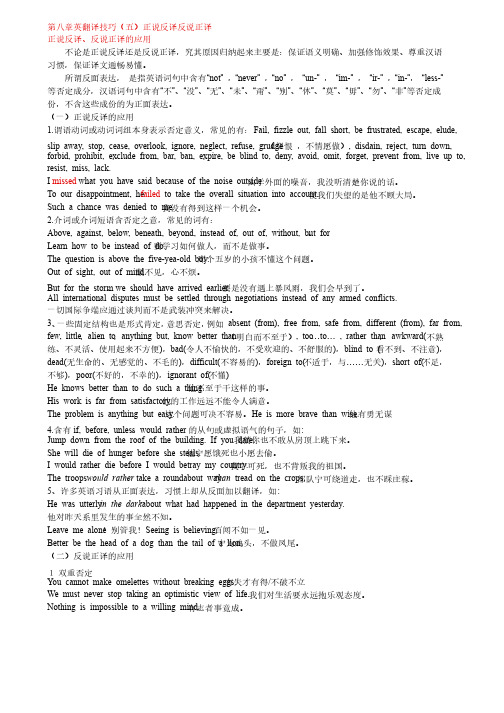
第八章英翻译技巧(五)正说反译反说正译正说反译、反说正译的应用不论是正说反译还是反说正译,究其原因归纳起来主要是:保证语义明确、加强修饰效果、尊重汉语习惯,保证译文通畅易懂。
所谓反面表达,是指英语词句中含有“not”,“never”,“no”,“un-”,“im-”,“ir-”,“in-”,“less-”等否定成分,汉语词句中含有“不”、“没”、“无”、“未”、“甭”、“别”、“休”、“莫”、“毋”、“勿”、“非”等否定成份,不含这些成份的为正面表达。
(一)正说反译的应用1.谓语动词或动词词组本身表示否定意义,常见的有:Fail, fizzle out, fall short, be frustrated, escape, elude, slip away, stop, cease, overlook, ignore, neglect, refuse, grudge(怨恨,不情愿做), disdain, reject, turn down, forbid, prohibit, exclude from, bar, ban, expire, be blind to, deny, avoid, omit, forget, prevent from, live up to, resist, miss, lack. I missed what you have said because of the noise outside.由于外面的噪音,我没听清楚你说的话。
To our disappointment, he failed to take the overall situation into account. 使我们失望的是他不顾大局。
Such a chance was denied to me.我没有得到这样一个机会。
2.介词或介词短语含否定之意,常见的词有:Above, against, below, beneath, beyond, instead of, out of, without, but for。
第七部分 正说反译,反说正译
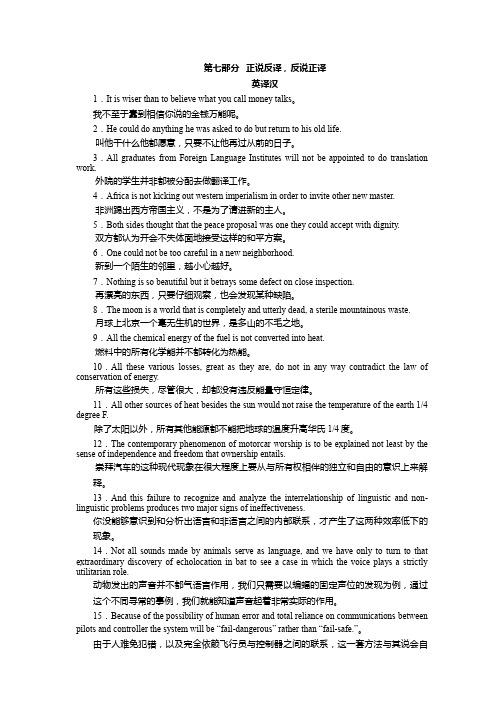
第七部分正说反译,反说正译英译汉1.It is wiser than to believe what you call money talks。
我不至于蠢到相信你说的金钱万能呢。
2.He could do anything he was asked to do but return to his old life.叫他干什么他都愿意,只要不让他再过从前的日子。
3.All graduates from Foreign Language Institutes will not be appointed to do translation work.外院的学生并非都被分配去做翻译工作。
4.Africa is not kicking out western imperialism in order to invite other new master.非洲踢出西方帝国主义,不是为了请进新的主人。
5.Both sides thought that the peace proposal was one they could accept with dignity.双方都认为开会不失体面地接受这样的和平方案。
6.One could not be too careful in a new neighborhood.新到一个陌生的邻里,越小心越好。
7.Nothing is so beautiful but it betrays some defect on close inspection.再漂亮的东西,只要仔细观察,也会发现某种缺陷。
8.The moon is a world that is completely and utterly dead, a sterile mountainous waste.月球上北京一个毫无生机的世界,是多山的不毛之地。
9.All the chemical energy of the fuel is not converted into heat.燃料中的所有化学能并不都转化为热能。
正反译法

(三)形容词或形容词短语
(1) We were watching the fluid situation with concern. 我们关切地注视着动荡不安的局面。 (2) He would be the last man to say such things. 他绝不可能说这种话。 类似的形容词及其短语absent(不在;不 类似的形容词及其短语absent(不在;不 到),awkward(不熟练;不灵活;使用起 到),awkward(不熟练;不灵活;使用起 来不方便),bad(令人不愉快的;不受欢 来不方便),bad(令人不愉快的;不受欢 迎的;不舒服的),blind(看不到;不注 迎的;不舒服的),blind(看不到;不注 意),dead(无生命的;无感觉的;不毛 意),dead(无生命的;无感觉的;不毛
(七)句子
(1) The critic had something of a case. 批评家也并非全然没有道理。 (4) I am wiser than to believe such stories. 我还不至于蠢到竟然相信这种谎言。
(八)某些含有否定意义的谚语和 警句
(1) Better to reign in hell than serve in heaven. 宁为鸡头,不为牛后。 (2) Seeing is believing. 百闻不如一见。 (3) Let sleeping dog lie. 莫惹是生非。 (4) A bird in the hand is worth two in the bush. 双鸟在林不如一鸟在手。 (5) Call a spade a spade. 直言不讳。
正反译法
鉴于此,我们在翻译某些含有否定意义的 英文句子时,应当特别注意两点:一是英 语里有些从正面表达的词语或句子,汉译 时可以从反面来表达,即正说反译法;二 是英语里有些从反面表达的词语或句子, 汉译时可从正面来表达,即反说正译法。
《商务英语翻译》第2章 第四节 反译法

2.
SECTION 4
2.4 常用翻译方法与技巧系列:反译法 英语和汉语中均有从正面或者反面来表达同一 概念的现象。翻译时,英语里有些从正面表达 的词语或句子,汉译时可以从反面来表达,即 正说反译法;二是英语里有些从反面表达的词 语或句子,汉译时可从正面来表达,即反说正 译法。此两种情况统称反译法(Negation)。 一、正说反译 二、反说正译
返回
3. 副词性含蓄否定词
作副词用的含蓄否定词有: idly(漫不经心 地), slowly(不慌不忙地), predictably(不出 所料), safely(万无一失,错不了), exactly (一点不错), away(连续不断地)…
例11:She said idly, “Well, what does it matter?” 她漫不经心地说:“哼,这有什么关系?” 例12:Slowly he pulled the letter out of the envelopeand unfolded it. 他不慌不忙地从信封里抽出信纸打开来。
返回
三、其他情况的反译
一、正说反译
正说反译是指把英语的肯定句翻译为汉语的否
定句。 英语中有一些常用肯定形式的词,往往有否定 的含义,这些词称为含蓄否定词。这些词在翻译 时一般要从反面进行翻译,即翻译成汉语的否定 词组。它们包括:名词、动词、副词、形容词、 介词、连词等。
返回
名词:neglect, failure, ignorance, avoidance,
返回
6. 连词性含蓄否定词
作连词用的含蓄否定词有: unless(如果 不), or(否则), before(未…就,还没有… 就), too… not to(那么…不会不)rather… than(宁可…也不愿), with dignity(不失体面) , worthy of(不会辜负)…
正说反译与反说正译
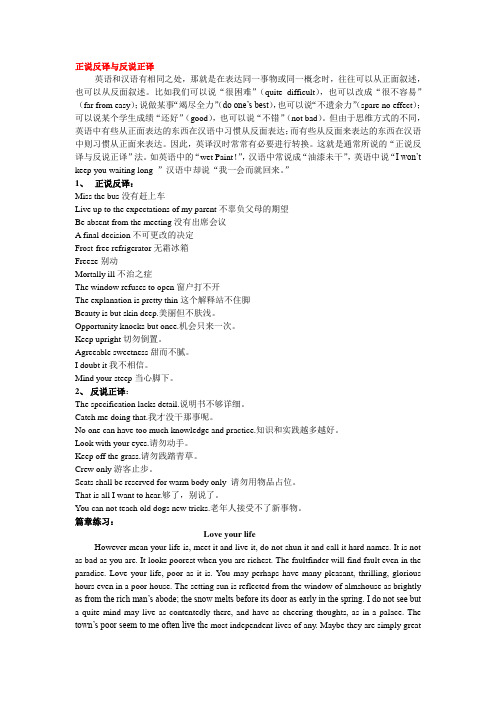
正说反译与反说正译英语和汉语有相同之处,那就是在表达同一事物或同一概念时,往往可以从正面叙述,也可以从反面叙述。
比如我们可以说“很困难”(quite difficult),也可以改成“很不容易”(far from easy);说做某事“竭尽全力”(do one’s best),也可以说“不遗余力”(spare no effect);可以说某个学生成绩“还好”(good),也可以说“不错”(not bad)。
但由于思维方式的不同,英语中有些从正面表达的东西在汉语中习惯从反面表达;而有些从反面来表达的东西在汉语中则习惯从正面来表达。
因此,英译汉时常常有必要进行转换。
这就是通常所说的“正说反译与反说正译”法。
如英语中的“wet Paint!”,汉语中常说成“油漆未干”,英语中说“I won’t keep you waiting long ”汉语中却说“我一会而就回来。
”1、正说反译:Miss the bus没有赶上车Live up to the expectations of my parent不辜负父母的期望Be absent from the meeting没有出席会议A final decision不可更改的决定Frost-free refrigerator无霜冰箱Freeze别动Mortally ill不治之症The window refuses to open窗户打不开The explanation is pretty thin这个解释站不住脚Beauty is but skin deep.美丽但不肤浅。
Opportunity knocks but once.机会只来一次。
Keep upright切勿倒置。
Agreeable sweetness甜而不腻。
I doubt it我不相信。
Mind your steep当心脚下。
2、反说正译:The specification lacks detail.说明书不够详细。
- 1、下载文档前请自行甄别文档内容的完整性,平台不提供额外的编辑、内容补充、找答案等附加服务。
- 2、"仅部分预览"的文档,不可在线预览部分如存在完整性等问题,可反馈申请退款(可完整预览的文档不适用该条件!)。
- 3、如文档侵犯您的权益,请联系客服反馈,我们会尽快为您处理(人工客服工作时间:9:00-18:30)。
1、正说反译:Miss the bus没有赶上车Live up to the expectations of my parent不辜负父母的期望Be absent from the meeting没有出席会议A final decision不可更改的决定Frost-free refrigerator无霜冰箱Freeze别动Mortally ill不治之症The window refuses to open窗户打不开Children were excluded from getting in the building 儿童不许进入这个房间The explanation is pretty thin这个解释站不住脚I have fallen behind with my correspondence我有一些信件还没有回复Fully clothes, he fell across his bunk and was instantly sleep 衣服也不脱,他往床上横着一倒,不一会儿就睡着了Don’t lose time in posting this letter不要忘了寄这封信No deposit will be refunded unless ticket produced凭票退押金例1:原文:她忍住了没有笑出声。
译文:She refrained from laughing.例2:原文:花园根本无人整理。
译文:The garden was in a state of total neglect.例3:原文:我不能忍受你的脾气。
译文:Your temper is more than I can bear.例4:原文:他宁死不屈。
译文:He would die before yielding.例5:原文:生活远非净是乐事。
译文:Life is far from being a bed of roses.例6:原文:风景美得无以言表。
译文:The scenery is too beautiful for words.That’s a thing that might happen to anyone.这种事谁也免不了。
Opportunity knocks but once.机会只来一次。
2.反说正译Such flig hts couldn’t long escape notice.这样的飞行迟早要被发现的。
一.反说正译:我们将正译法的使用大致分为三类.(一)祈使句中的否定说法有时正译,因为说话人想表达的常常是一个正面的意义. No smoking!严禁吸烟No deposit will be refunded unless ticket produced.凭票退还押金.Don't lose time in posting this letter.赶快把这封信寄出去.(二)双重否定正译.We must never stop taking an optimistic view of life.我们对生活要永远抱乐观态度.The significance of these incidents wasn't lost on us.这件事引起了我们的重视.Such mistakes couldn't long escape notice.这类错误迟早会被发觉的.Elliott was too clever not see that many of the persons who accepted his invitation did so only to get a free meal and that of these some were stupid and some worthless.艾略特是一个聪明人.他定能看得出许多接受他邀请的人只是为了来吃一顿不花钱的饭.他知道这些人有的愚不可及,有的则微不足道.(三)有些否定表达在译成汉语时,为了符合目的语的语言习惯,则需使用正译法. The examination left no doubt that the patient died of cancer.检验结果清楚地表明病人死于癌症.Even so, I still insist that for the individual himself nothing is more important than this personal, interior sense of right and wrong.即便如此,我仍坚持认为,对个人而言,最重要的莫过于这种根植于个人心灵深处的是非感,以及坚决按这种是非感行事的决心.Hitler's undisguised effort to persecute the Jews met with world-wide condemnation.希特勒对犹太人的露骨迫害行为受到全世界的谴责.Mr. Rumsfeld said the Soviet Union was unprecedentedly engaged in a missle-building program.拉姆斯菲尔德说,苏联正以空前的规模推行制造导弹的计划.二.正说反译:(一)英语中很多词本身就含有否定意义,beyond, absent, stop, bad, avoid, exclude, except, doubt, resistant, refuse, few, little, 这类词在翻译中要译出它的含有的否定意义.The window refuses to open.窗户打不开.Children were excluded from getting in the building.孩子不许进入这幢楼房.Such a chance denied me.我没有得到这个机会.The explanation is pretty thin.这个解释站不住脚.I have fallen behind with my correspondence.我有一些信件没有及时答复.Fully clothed, he fell across his bunk and was instantly sleep.他衣服也不脱往床铺上横着一躺,很快就睡着了.He was 75, but he carried his years lightly.他75岁了,可是并不显老.(二)有些正反译法可以增强修辞效果,但使用的时候需要非常慎重.Sir William and Lady Lucas are determined to go, merely on that account, for in general you know they visit no new comers.卢卡斯爵士夫妇打定主意要去,还不就是为了这个缘故,因为你知道,他们通常是不去拜访新搬来的邻居的.翻译练习在翻译下列句子时请使用正反译法(注意斜体部分).The world today is far from peaceful.Africa is not kicking out Western imperialism in order to invite other new masters.Mr. White has refrained from making any official comment on the coup in that country.Don't make your conclusion before the end of the year.The train coming from Moscow will arrive in no time.Her husband hates to see her stony face.Do you know why she is always trying to avoid youLaw is no respecter of persons.His arrival three days in advance is beyond our expectation.The idea that he should become an assistant to his boss has never deserted him.三,汉译英正说反译法汉语中有些词语是肯定(正说)的,但译成英语却是否定(反说)的.例如:欧妮铺上一块洁净的白桌布,又去取来些葡萄.Eugenie unfolded a clean white table cloth and went to fetch some grapes. 在希腊人的生活中,奴隶制是得到默许的.Slavery was implicit in Greek life.(形容词)她非常勉强地来了.She came very unwillingly.(副词)这家机构因公正在国际上享有声誉.The agency enjoys an international reputation for impartiality.(名词) 她光着脚走进了房间.She came into the room with no shoes on.(介词短语) 尼克松是个彻底的现实主义者.Nixon was nothing if not a realist.(短语)。
